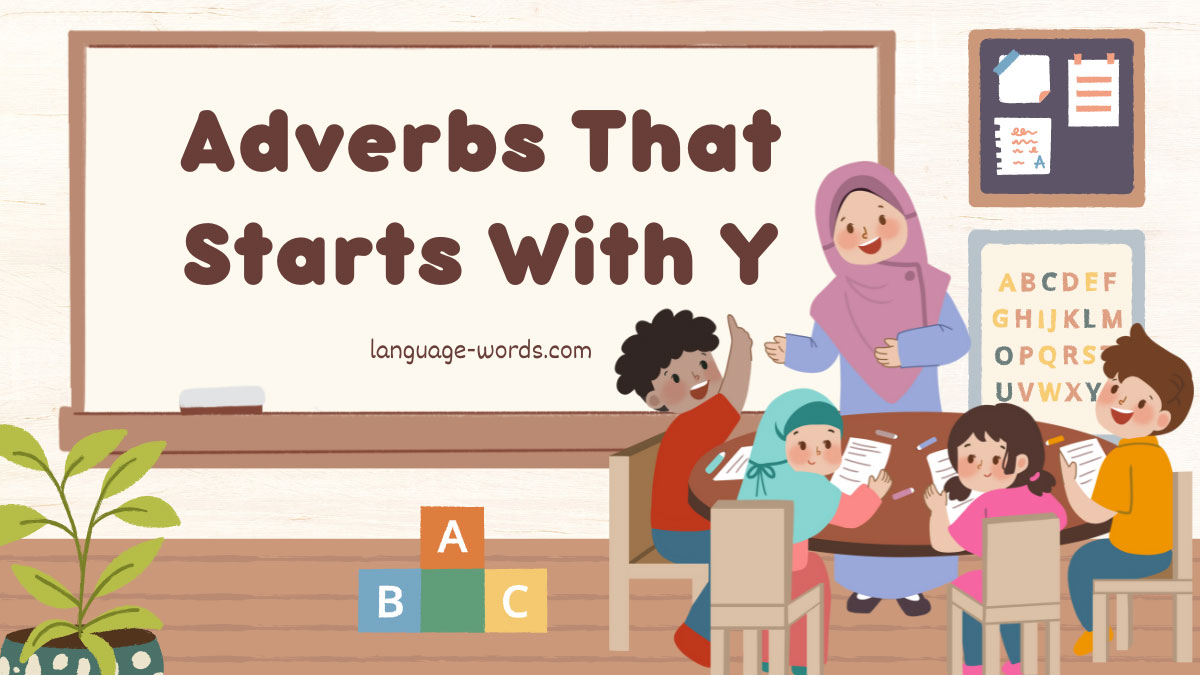Hey there! Today, I want to dive into the fascinating world of adverbs that start with the letter “y”. Adverbs are like the secret ingredients that add flavor and depth to our sentences, and the ones that start with “y” are no exception. From “yesterday” to “yearly”, these adverbs have the power to enhance our writing and convey specific meanings.
In this article, I’ll be sharing a curated list of adverbs that start with “y” and exploring their various uses and nuances. Whether you’re a writer looking to expand your vocabulary or simply someone curious about the English language, this article has got you covered. We’ll uncover adverbs that describe time, frequency, manner, and more. So, let’s get ready to discover the wonderful world of “y” adverbs and bring a touch of uniqueness to our sentences.
Adverbs that Start with “Y”

Definition of Adverbs that Start with “Y”
When it comes to adding depth and flavor to sentences, adverbs play a crucial role. These modifiers provide information about time, frequency, manner, and more. Adverbs that start with the letter “Y” are no exception. They add a unique touch to sentences and help to expand our vocabulary.
Examples of Adverbs that Start with “Y”
Here are some examples of adverbs that start with the letter “Y”:
- Yesterday: I saw him yesterday at the park.
- Yearly: We go on a vacation yearly.
- Yearningly: She yearningly looked out the window, hoping to see him.
- Yesterday: I saw him yesterday at the park.
- Yonder: The house is located yonder, just beyond that hill.
As you can see, yesterday describes a specific time in the past, yearly indicates something happening once a year, and yearningly portrays a longing manner. On the other hand, yonder points to a location beyond a certain point. These adverbs add precision to our sentences, giving them a more vivid and descriptive quality.
Remember, incorporating adverbs that start with “Y” can enhance your writing and add an element of uniqueness. So go ahead, explore these adverbs and experiment with them in your own sentences.
List Of Adverbs That Starts With Y

| Yon | Yearly | Yep | Yesternight |
| Yore | Yesteryear | Yeah | Yonder |
| Yieldingly | Ywis | Youthfully | Yearningly |
| Yes | Yea | Yeomanly | Yarely |
| Yet | Yesterday | Yestereve | Yestreen |
Common Usage of Adverbs that Start with “Y”
Describing Manner
When it comes to describing manner, adverbs that start with “Y” can help add nuance and specificity to our sentences. Here are a few examples:
- Yearningly: I looked at the puppy yearningly, hoping it would come closer.
- Yawningly: He bored me with his long, yawningly monotonous speech.
- Yieldingly: She smiled, yieldingly accepting his apology.
By incorporating these adverbs into our writing, we can paint a clearer picture of how an action is performed or an emotion is expressed.
Indicating Frequency
Adverbs that start with “Y” can also be used to indicate frequency. Here are a few commonly used ones:
- Yearly: The company holds a yearly meeting to discuss its progress.
- Yesterday: I saw her yesterday at the park.
- Yet: I haven’t finished my homework yet.
These adverbs provide a temporal context and convey how often an event or action occurs.
Expressing Degree or Intensity
Adverbs that start with “Y” can express degree or intensity, amplifying the meaning of the verb or adjective they modify. Consider the following examples:
- Yonder: The mountain peak stood yonder, majestic and untouchable.
- Yellingly: The angry customer yelled loudly at the manager.
- Yuckily: The food tasted yuckily, and I couldn’t finish it.
These adverbs add color and emphasis to our writing, allowing for a more vivid expression of emotions or sensations.
With these examples in mind, it’s evident that adverbs that start with “Y” can enhance our writing by providing specific details about manner, frequency, and intensity. By incorporating these adverbs into our vocabulary, we can create more engaging and descriptive sentences. So, let’s explore and experiment with these adverbs in our own writing to bring our words to life.
Tips for Using Adverbs that Start with “Y” Effectively

Use Adverbs Sparingly
When incorporating adverbs that start with “Y” into your writing, it’s important to use them sparingly. While these adverbs can add a touch of descriptive quality to your sentences, overusing them can lead to cluttered and repetitive writing. Instead, choose the most impactful adverbs that truly enhance your sentence and help convey your intended meaning. Remember, moderation is key when it comes to using adverbs effectively.
Consider the Context
The context in which you use adverbs that start with “Y” is crucial in ensuring that they are used effectively. Take a moment to analyze the sentence and determine if the adverb truly adds value to the message you are trying to convey. Consider the tone, purpose, and overall meaning of your sentence, and choose the adverb that aligns best with these elements. This will help your writing flow naturally and make your sentences more engaging and descriptive.
Be Mindful of Word Order
Incorporating adverbs that start with “Y” effectively also requires you to be mindful of word order in your sentences. Generally, adverbs are placed before the verb they modify, but there can be exceptions. Experiment with different word placements to find the most clear and natural-sounding sentence structure. Rearranging your words can help emphasize the adverb and create a smoother reading experience.
By following these tips, you can harness the power of adverbs that start with “Y” to enhance your writing. Remember to use them sparingly, consider the context, and be mindful of word order. Incorporate these adverbs thoughtfully, and watch as your sentences come alive with precision and descriptive quality.
Conclusion
In this article, we have explored the world of adverbs that start with the letter “Y” and how they can elevate our writing to new heights. By incorporating these adverbs into our sentences, we can add precision, descriptive quality, and a touch of flair.
Throughout the article, we have seen examples of how these adverbs can be used to describe manner, indicate frequency, and express degree or intensity. From “yearningly” to “youthfully,” these adverbs offer a wide range of possibilities to enhance our writing.
To use adverbs that start with “Y” effectively, it is important to use them sparingly and consider the context in which they are being used. Additionally, being mindful of word order can help ensure that these adverbs have the desired impact on our sentences.
By incorporating these tips and techniques, we can create writing that is engaging, descriptive, and captivating. So, the next time you sit down to write, don’t forget to explore the world of adverbs that start with “Y” and watch your sentences come alive with vibrant language. Happy writing!

